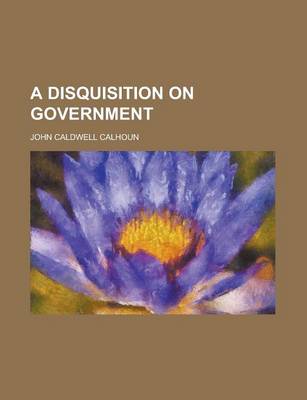Tantor Audiobook Classics
1 total work
This volume provides the most economical and textually accurate
version of Calhoun’s Disquisition available today. As a treatise,
the Disquisition is one of the greatest and most enduring works of
American politial thought, and a text of seminal importance to all
students of American politics, history, philosophy, and law.
In the Disquisition, Calhoun believed he had laid a “solid foundation
for political science” through revitalizing popular rule. To complete
his theoretical and practical mission, Calhoun attempts to explain
the best example of the diffusion of authority and cultivation of
liberty: the American Constitution. The fundamental law of the
American republic provided, after all, the “interior structure” for
regulating the shape and scope of government. As a guide for the
states and the general government, the Constitution was also part
of the “organism” that limited the centralization of authority and
allowed for genuine popular rule; and it was Calhoun’s exposition
of the connection between the moral demands of a properly constituted
concept of popular rule and the need for practical ordering principles
that is articulated in this book.
Calhoun presents a theory of politics that is both original and in accord
with the mainstream of the American political tradition. More than
any other thinker of his period, Calhoun sought to explain the enduring
qualities of American political thought in light of the troubled world
of the mid-nineteenth century. Unlike other theorists who had preceded
and would follow Calhoun, both American and European, he did not
seek to invent a new mode of philosophical speculation or a “grand
theory” for the human sciences. Instead, he attempted to offer a
refinement of classical, medieval, and modern notions regarding the
relationship between government and the social order. As an effort in
philosophical retrenchment, the Disquisition strengthened many
pre-existing conceptions regarding political liberty and popular rule
within the American regime, while offering such insight with a view
toward the future that awaited America. Calhoun’s attempt in the
Disquisition to reconcile the good of popular rule with ethical
requirements have singular relevance to the many nations in the
twenty-first century now engaged, despite the ethnic animosities
threatening their destruction, in building post-ideological, civilized
political and social orders, especially the peoples of Central and
Eastern Europe, Russia, and Africa.
H. Lee Cheek, Jr., is Chair of the Social and Behavioral Sciences
Division of Brewton-Parker College in Mount Vernon, Georgia. Cheek
is a leading Calhoun scholar and author of Calhoun and Popular Rule
and John C. Calhoun: Selected Writings and Speechs, among his
numerous books.
version of Calhoun’s Disquisition available today. As a treatise,
the Disquisition is one of the greatest and most enduring works of
American politial thought, and a text of seminal importance to all
students of American politics, history, philosophy, and law.
In the Disquisition, Calhoun believed he had laid a “solid foundation
for political science” through revitalizing popular rule. To complete
his theoretical and practical mission, Calhoun attempts to explain
the best example of the diffusion of authority and cultivation of
liberty: the American Constitution. The fundamental law of the
American republic provided, after all, the “interior structure” for
regulating the shape and scope of government. As a guide for the
states and the general government, the Constitution was also part
of the “organism” that limited the centralization of authority and
allowed for genuine popular rule; and it was Calhoun’s exposition
of the connection between the moral demands of a properly constituted
concept of popular rule and the need for practical ordering principles
that is articulated in this book.
Calhoun presents a theory of politics that is both original and in accord
with the mainstream of the American political tradition. More than
any other thinker of his period, Calhoun sought to explain the enduring
qualities of American political thought in light of the troubled world
of the mid-nineteenth century. Unlike other theorists who had preceded
and would follow Calhoun, both American and European, he did not
seek to invent a new mode of philosophical speculation or a “grand
theory” for the human sciences. Instead, he attempted to offer a
refinement of classical, medieval, and modern notions regarding the
relationship between government and the social order. As an effort in
philosophical retrenchment, the Disquisition strengthened many
pre-existing conceptions regarding political liberty and popular rule
within the American regime, while offering such insight with a view
toward the future that awaited America. Calhoun’s attempt in the
Disquisition to reconcile the good of popular rule with ethical
requirements have singular relevance to the many nations in the
twenty-first century now engaged, despite the ethnic animosities
threatening their destruction, in building post-ideological, civilized
political and social orders, especially the peoples of Central and
Eastern Europe, Russia, and Africa.
H. Lee Cheek, Jr., is Chair of the Social and Behavioral Sciences
Division of Brewton-Parker College in Mount Vernon, Georgia. Cheek
is a leading Calhoun scholar and author of Calhoun and Popular Rule
and John C. Calhoun: Selected Writings and Speechs, among his
numerous books.
